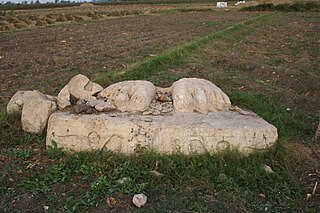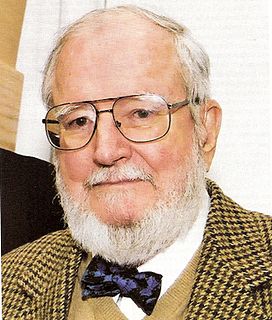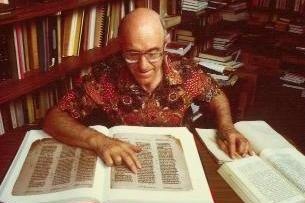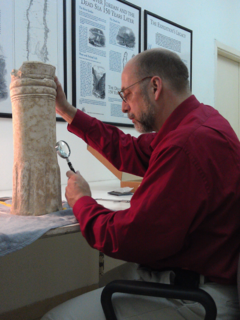Related Research Articles

Yahweh was the national god of ancient Israel and Judah. The origins of his worship reach at least to the early Iron Age, and likely to the Late Bronze Age. In the oldest biblical literature, he is a storm-and-warrior deity who leads the heavenly army against Israel's enemies; at that time the Israelites worshipped him alongside a variety of Canaanite gods and goddesses, including El, Asherah and Baal; in later centuries, El and Yahweh became conflated and El-linked epithets such as El Shaddai came to be applied to Yahweh alone, and other gods and goddesses such as Baal and Asherah were absorbed into the Yahwist religion.

The land of Goshen is named in the Hebrew Bible as the place in Egypt given to the Hebrews by the pharaoh of Joseph, and the land from which they later left Egypt at the time of the Exodus. It is believed to have been located in the eastern Nile Delta, lower Egypt; perhaps at or near Avaris, the seat of power of the Hyksos kings.
James Bennett Pritchard was an American archeologist whose work explicated the interrelationships of the religions of ancient Palestine, Canaan, Egypt, Assyria, and Babylon. Pritchard was honored with the Gold Medal Award for Distinguished Archaeological Achievement in 1983 from the Archaeological Institute of America.
Kenneth Anderson Kitchen is a British biblical scholar, Ancient Near Eastern historian, and Personal and Brunner Professor Emeritus of Egyptology and Honorary Research Fellow at the School of Archaeology, Classics and Egyptology, University of Liverpool, England. He specialises in the ancient Egyptian Ramesside Period, and the Third Intermediate Period of Egypt, as well as ancient Egyptian chronology, having written over 250 books and journal articles on these and other subjects since the mid-1950s. He has been described by The Times as "the very architect of Egyptian chronology".

Biblical archaeology is an academic school and a subset of Biblical studies and Levantine archaeology. Biblical archaeology studies archaeological sites from the Ancient Near East and especially the Holy Land, from biblical times.

Pithom was an ancient city of Egypt. Multiple references in ancient Greek, Roman, and Hebrew Bible sources exist for this city, but its exact location remains somewhat uncertain. A number of scholars identified it as the later archaeological site of Tell El Maskhuta. Others identified it as the earlier archaeological site of Tell El Retabeh.
Edwin Masao Yamauchi is a Japanese-American historian, (Protestant) Christian apologist, editor and academic. He is Professor Emeritus of History at Miami University, where he taught from 1969 until 2005. He is married to Kimie Yamauchi.

Pi-Ramesses was the new capital built by the Nineteenth Dynasty Pharaoh Ramesses II at Qantir, near the old site of Avaris. The city had served as a summer palace under Seti I, and may have been founded by Ramesses I while he served under Horemheb.
William Gwinn Dever is an American archaeologist, Old Testament scholar, and historian, specialized in the history of the Ancient Near East and the ancient kingdoms of Israel and Judah in biblical times. He was Professor of Near Eastern Archaeology and Anthropology at the University of Arizona in Tucson from 1975 to 2002. He is a Distinguished Professor of Near Eastern Archaeology at Lycoming College in Pennsylvania.
George Ernest Wright, was a leading Old Testament scholar and biblical archaeologist. An expert in Ancient Near Eastern archaeology, he was especially known for his work in the study and dating of pottery. He was associated with the biblical theology movement.
Jimmy Jack McBee Roberts, known as J. J. M. Roberts, is William Henry Green Professor of Old Testament Literature (Emeritus) at Princeton Theological Seminary in Princeton, New Jersey. A member of the Churches of Christ, Roberts attended Abilene Christian University before pursuing doctoral work at Harvard University.
Thomas L. Thompson is an American-born Danish biblical scholar and theologian. He was professor of theology at the University of Copenhagen from 1993 to 2009. He currently lives in Denmark.

Frank Moore Cross Jr. (1921–2012) was the Hancock Professor of Hebrew and Other Oriental Languages Emeritus at Harvard University, notable for his work in the interpretation of the Dead Sea Scrolls, his 1973 magnum opusCanaanite Myth and Hebrew Epic, and his work in Northwest Semitic epigraphy. Many of his essays on the latter topic have since been collected in Leaves from an Epigrapher's Notebook.

Francis Ian Andersen was an Australian scholar in the fields of biblical studies and Hebrew. Together with A. Dean Forbes, he pioneered the use of computers for the analysis of biblical Hebrew syntax. He taught Old Testament, History, and Religious Studies at various institutions in Australia and the United States, including Macquarie University, the University of Queensland, and Fuller Theological Seminary. His published works include the Tyndale commentary on Job, and Anchor Bible commentaries on Hosea, Amos, Habakkuk and Micah, and over 90 papers.

Prof. Christopher A. Rollston is a scholar of the ancient Near East, specializing in Hebrew Bible, Greek New Testament, Old Testament Apocrypha, Northwest Semitic literature, epigraphy and paleography.
Patrick D. Miller, Jr. was an American Old Testament scholar who served as Charles T. Haley Professor of Old Testament Theology at Princeton Theological Seminary from 1984 to 2005. He was an ordained minister in the Presbyterian Church (U.S.A.).
Carol A. Newsom is an American biblical scholar, historian of ancient Judaism, and literary critic. She is the Charles Howard Candler Professor Emerita of Old Testament at the Candler School of Theology and a former senior fellow at the Center for the Study of Law and Religion at Emory University. She is a leading expert on the Dead Sea Scrolls, Wisdom literature, and the Book of Daniel.

Yahwism is the name given by modern scholars to the religion of ancient Israel. Yahwism was polytheistic, with a plethora of gods and goddesses. Heading the pantheon was Yahweh, with his consort, the goddess Asherah; below them were second-tier gods and goddesses such as Baal, Shamash, Yarikh, Mot, and Astarte, all of whom had their own priests and prophets and numbered royalty among their devotees, and a third and fourth tier of minor divine beings, including the mal'ak, the messengers of the higher gods, who in later times became the angels of Christianity, Judaism and Islam.
References
- ↑ Dearborn, J. Andrew (2002). "J. Maxwell Miller, Scholar and Teacher: A Sketch". The Land that I Will Show You: Essays on the History and Archaeology of the Ancient Near East in Honor of J. Maxwell Miller. p. 16.
- ↑ "J. Maxwell Miller". Emory University . Retrieved 16 February 2022.